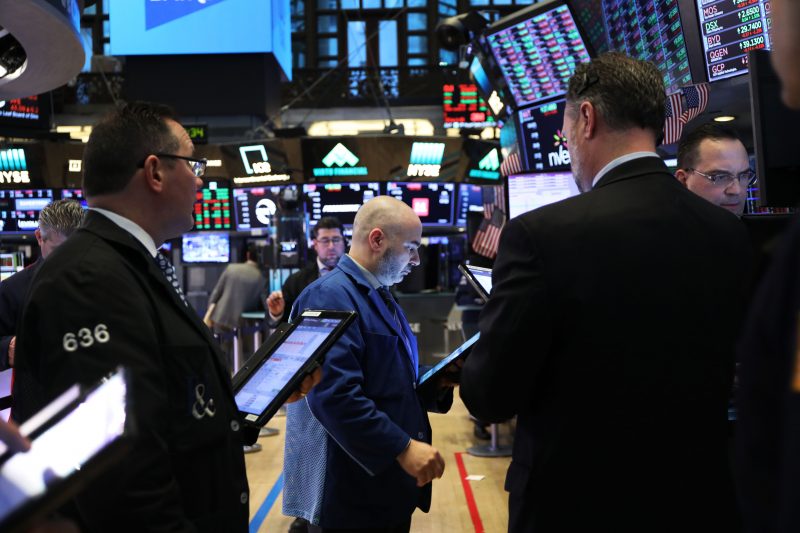Global stocks mostly fall on weakening growth outlook
Analysts say weakness in stocks is because the market has already priced in a US-China trade agreement (SPENCER PLATT)
New York (AFP) – Global stocks mostly fell Wednesday on the dimming outlook for economic growth and questions over the US-China trade talks.
Wall Street finished firmly lower, with the S&P 500 shedding 0.7 percent, its latest weak showing after a strong open to 2019.
Sentiment was dented by the Organization for Economic Cooperation and Development on Wednesday, which cut its global growth forecast for 2019 to 3.3 percent from the prior 3.5 percent.
“High policy uncertainty, ongoing trade tensions and a further erosion of business and consumer confidence are all contributing to the slowdown,” the OECD said in an interim version of its Economic Outlook.
US data were mixed, with the trade deficit hitting a 10-year peak in 2018 and private-sector hiring slowing somewhat in February compared with January.
“It’s perfectly normal to see the market pull back, especially after such a rally,” said Adam Sarhan, chief executive of 50 Park Investment, who also cited slowing growth expectations as a headwind.
Analysts in recent days have also attributed the weakness in stocks to a growing sense that the market has already largely priced in a US-China trade agreement. Progress on talks between Beijing and Washington has been a factor in Wall Street’s rise early in 2019. A final agreement could be reached later this month.
Earlier, both Paris and Frankfurt fell modestly, while London edged higher.
Economists believe global headwinds will also prompt the European Central Bank to lower growth and inflation forecasts on Thursday. Some observers believe the ECB is blocked from responding to the soft patch in growth after years of crisis firefighting.
In December it ended more than three years of mass “quantitative easing” purchases of government and corporate bonds, which ultimately amounted to 2.6 trillion euros ($3.0 trillion) — although it will for now replenish its stock as bonds mature.
Meanwhile interest rates are fixed at historic lows “at least through the summer of 2019” in its regular policy statements — leaving little room to stimulate the economy by traditional means.
The ECB’s governing council would be loath to restart bond purchases short of a major crisis.
And lowering rates still further is unrealistic, although the horizon for raising them could be pushed further into the future.
“We suspect that there is still no consensus on the next policy moves” among members, Capital Economics analyst Andrew Kenningham commented.
– Key figures around 2100 GMT –
New York – Dow: DOWN 0.5 percent at 25,673.46 (close)
New York – S&P 500: DOWN 0.7 percent at 2,771.45 (close)
New York – Nasdaq: DOWN 0.9 percent at 7,505.92 (close)
London – FTSE 100: UP 0.2 percent at 7,196.18 (close)
Frankfurt – DAX 30: DOWN 0.3 percent at 11,587.63 (close)
Paris – CAC 40: DOWN 0.2 percent at 5,288.81 (close)
EURO STOXX 50: DOWN 0.1 percent at 3,324.67 (close)
Tokyo – Nikkei 225: DOWN 0.6 percent at 21,596.81 (close)
Hong Kong – Hang Seng: UP 0.3 percent at 29,037.60 (close)
Shanghai – Composite: UP 1.6 percent at 3,102.10 (close)
Pound/dollar: DOWN at $1.3176 from $1.3178 at 2200 GMT
Euro/pound: UP at 85.83 pence from 85.81 pence
Euro/dollar: UP at $1.1313 from $1.1308
Dollar/yen: DOWN at 111.76 yen from 111.89 yen
Oil – Brent Crude: UP 13 cents at $65.99 per barrel
Oil – West Texas Intermediate: DOWN 34 cents at $56.22 per barrel
burs-jmb/dg
Disclaimer: This story is published from a syndicated feed. Siliconeer does not assume any liability for the above story. Validity of the above story is for 7 Days from original date of publishing. Content copyright AFP.


